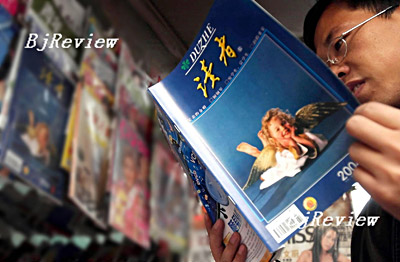
At the beginning of 2007, China's most popular magazine Reader, or Du Zhe, launched a website, a milestone of development for the leisure magazine that has been breaking records throughout its 26 years of history.
On the eve of the semimonthly magazine's 25th birthday last April, Reader passed another milestone in circulation: selling 10 million copies of a single issue, the largest number in three decades of China's periodicals industry.
Up to January 2004, Reader had achieved a total circulation of 800 million copies, with no parallel in China's over 9,000 magazine titles. According to statistics at that time from the International Federation of the Periodical Press, similar circulation levels have only ever been seen in three U.S. magazines: Reader's Digest, National Geographic and Time.
"Tapping the potential of the Internet is the development trend of the media. Thus magazine people have to take advantage of the trend through analyzing the advantages and disadvantages," said the Publisher of Reader Peng Changcheng. "The key is to establish interaction between printed magazines and their websites through good marketing practices that will create a win-win model for both media."
In his opinion, digital magazines will not be able to replace printed ones. "Magazines have a unique charm as a medium that will guarantee their longevity. In terms of our magazine the Internet has provided us with a tool to make it a better magazine," he said.
When the magazine was launched in 1981, it gave itself the title of Duzhewenzhai, a literal translation of Reader's Digest, the same as its highly popular American counterpart. The Chinese magazine had to change to its current title due to a lawsuit over intellectual property rights filed by the American magazine in 1993. However, the momentum of the magazine remains unchecked. "Our annual distribution has been growing at the speed of 1 million copies," said Peng.
Different from China's other successful magazines, Reader's headquarters is disadvantageously located in the northwestern Gansu Province, an economic backwater with limited resources and information to sustain a magazine. At the magazine's inception, almost nobody expected it to grow as big as it has.
Yet Reader's consistent editing approach, "serving chicken soup for the soul," which was unique among Chinese magazines in the early 1980s, has seen it rise to fame.
"People universally share a common humanity and a common universal human soul and we touch our readers on this level," said Peng. Reader is considered by many people as offering a spiritual harbor for collecting motivational stories from Chinese and foreign media to open the heart and rekindle the spirit, according to Peng.
He also said a successful magazine should keep up with changing times, which is another editing principle of Reader. Peng thinks his magazine has been good at absorbing fresh stories and language from current affairs and discussing issues of keen public concern, such as sustainable development, curbing corruption and equal education opportunities. Toward such a goal, Reader also carries serial articles on a single issue to provide its audience with an all-around picture of it.
"Elegant and inviting has become a signature style of Reader toward its goal of enriching the pop culture of China," said Peng.
Its low price scheme is another recipe for the success of Reader, which has maintained the lowest price among magazines of the same number of pages. In 1986, the magazine priced itself at 0.98 yuan per issue.
Talking about the business figures, Peng revealed that printing accounts for more than 50 percent of the total costs of the magazine while distribution costs account for another 40 percent. Both figures are unusually high in China's periodical industry. Although the magazine is under economic pressure to raise its price, Peng claimed that the final decision hinges on readers' affordability and the expansion plans of the magazine.
To attract more subscribers, Reader has introduced the "gift subscription" scheme. "As far as I know, we are the first publication to invent such a practice [in China] for our loyal readers to subscribe for their spouses, friends or parents," said Peng.
Reader is active in supporting charitable causes and environmental protection. "Many participants in these activities have ended up becoming our loyal readers," said Peng. He also strives to make the magazine available to the widest number of people. Besides mailing subscription leaflets to local post offices, Reader has established a vast retailing network including a large number of drug stores and villages. "Behind our admirable distribution figure is the colossal work we have done," summarized Peng.
Reader has advocated building an innovative editing system. Peng said, "Since most articles in our magazine are not original, we have attached great importance to the creativity and originality of our editing style to make the final product original."
Reader has invented an on-duty editor-in-chief system to give every senior editor with the magazine an opportunity to be the acting editor-in-chief for several issues in a row. According to Peng, this helps to fully tap everyone's potential.
At the beginning of last year, Reader founded a publishing group, which put the best-selling magazine in the most-populated country on a brand new starting line of development. | 